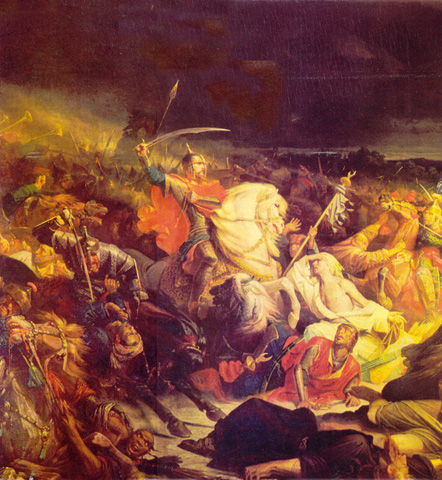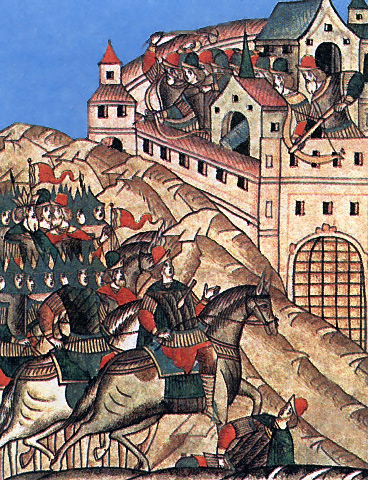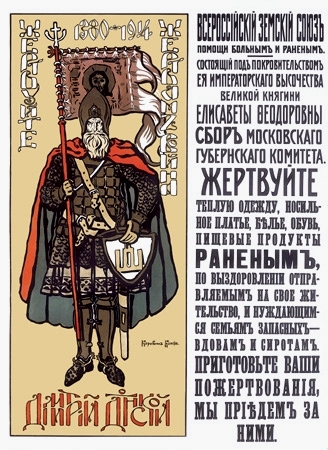<Back to Index>
- Entomologist Étienne Louis Geoffroy, 1725
- Painter Piero della Francesca, 1415
- Grand Prince of Moscow Dmitry Ivanovich Donskoy, 1350
PAGE SPONSOR
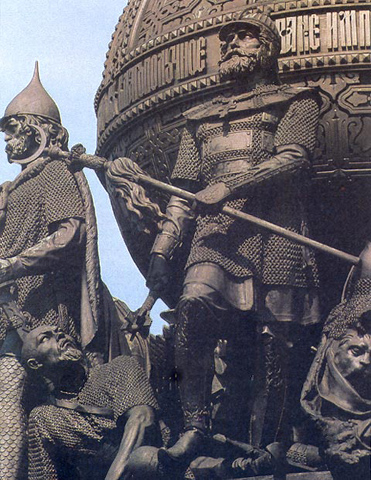
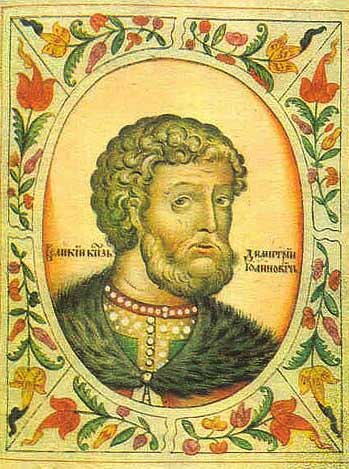
Saint Dmitry Ivanovich Donskoy (Russian: Дми́трий Ива́нович Донско́й, also known as Dimitrii), or Dmitry of the Don, sometimes referred to as Dmitry I (12 October 1350, Moscow – 19 May 1389, Moscow), son of Ivan II the Meek of Moscow (1326 – 1359), reigned as the Prince of Moscow from 1359 and Grand Prince of Vladimir from 1363 to his death. He was the first prince of Moscow to openly challenge Mongol authority in Russia. His nickname, Donskoy (i.e., "of the Don"), alludes to his great victory against the Tatars in the Battle of Kulikovo (1380) which took place on the Don River. He is venerated as a Saint in the Orthodox Church with his feast day on May 19.
Dmitry ascended the throne of Principality of Moscow at the age of 9. During his minority, the government was actually run by Metropolitan Aleksey of Russia. In 1360 the highest dignity among Russian princes, that of Grand Prince of Vladimir, was transferred by a Khan of the Golden Horde upon Dmitry Konstantinovich of Nizhniy Novgorod. In 1363, when that prince had been deposed, Dmitry Ivanovich was finally crowned at Vladimir. Three years later, he made peace with Dmitriy Konstantinovich and married his daughter Eudoxia. In 1376, their joined armies ravaged Volga Bulgaria.
The most important event during the early
years of Dmitry's reign was construction of the first
stone Moscow Kremlin,
completed in 1367. The new fortress allowed the city
to withstand two sieges by Algirdas of Lithuania, in 1368 and 1370. Attempt
for the third siege in 1372 ended in the Treaty of Lyubutsk. In 1375,
Dmitry managed to settle his conflict with Mikhail II of Tver over Vladimir in his
favour. Other princes of Northern Russia also
acknowledged his authority and contributed their
troops to his impending struggle against the Horde. By
the end of his reign, Dmitry more than doubled
the territory of Moscow principality.
Dmitry's thirty - year reign saw the beginning of the end of the Mongol domination of parts of what is now Russia. The Golden Horde was severely weakened by civil war and dynastic rivalries. Dmitry took advantage of this lapse in Mongol authority to openly challenge the Tatars.
While he kept the Khan's patent to collect taxes for all of Russia, Dmitry is also famous for leading the first Russian military victory over the Mongols. Mamai, a Mongol general and claimant to the throne, tried to punish Dmitry for attempting to increase his power. In 1378 Mamai sent a Mongol army, but it was defeated by Dmitry's forces in the Battle of Vozha River. Two years later Mamai personally led a large force against Moscow. Dmitry met and defeated it at the Battle of Kulikovo.
The defeated Mamai was presently dethroned by a rival Mongol general, Tokhtamysh. That khan reasserted Mongol rule over parts of what is now Russia and overran Moscow for Dmitry's resistance to Mamai. Dimitry, however, pledged his loyalty to Tokhtamysh and to the Golden Horde and was reinstated as Mongol principal tax collector and Grand Duke of Vladimir. Upon his death in 1389, Dimitry was the first Grand Duke to bequeath his titles to his son Vasiliy without consulting the Khan.
He was married to Eudoxia of Nizhniy Novgorod. She
was a daughter of Dmitry of Suzdal and
Vasilisa of Rostov. They had at least twelve
children.
